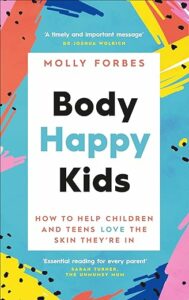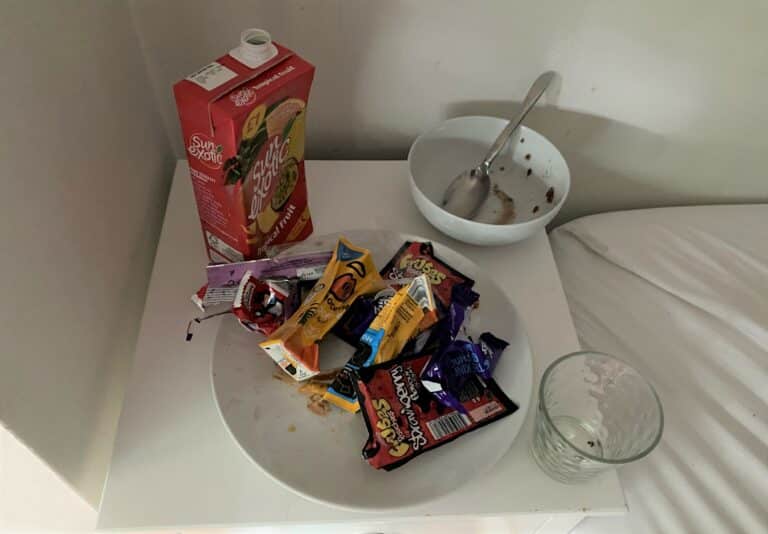Talking to a teenager about healthy eating (without giving them a complex)
During lockdown, lots of parents raised concerns with me about how to encourage teens to follow a more healthy lifestyle. Parents reported teenagers doing very little exercise, eating a lot of junk food and also putting on weight. Their most common questions were around how to motivate a teen to exercise and talking to a teenager about healthy eating without making them feel bad about their bodies or instilling body image anxiety.
These are tricky topics and I won’t pretend there are easy solutions. After a lifelong problematic relationship with biscuits, I still find it hard as an adult to navigate body image issues – and these are amplified one hundredfold for teens who might be growing their identity on shaky foundations or wobbly self-esteem.
So I was really pleased to be sent a review copy of Molly Forbes new book Body Happy Kids: How to help children and teens love the skin they’re in. Part self-help manual for parents and part manifesto, Body Happy Kids aims to unpick our “diet culture” which equates thinness with beauty, success and happiness and to offer parents tools for creating a more body happy family environment.
 Having read it, I’m not sure that Body Happy Kids will give parents of teens all the answers they are looking for. Don’t get me wrong, it’s full of great ideas and there is a really thorough must-read exposition of our cultural indoctrination in food anxiety. It’s just that lots of the strategies are more likely to be successful for parents of younger children. The loss of influence (and withdrawal from family life) that often happens during the teenage years, can make communicating with teens very tricky. Especially about sensitive topics.
Having read it, I’m not sure that Body Happy Kids will give parents of teens all the answers they are looking for. Don’t get me wrong, it’s full of great ideas and there is a really thorough must-read exposition of our cultural indoctrination in food anxiety. It’s just that lots of the strategies are more likely to be successful for parents of younger children. The loss of influence (and withdrawal from family life) that often happens during the teenage years, can make communicating with teens very tricky. Especially about sensitive topics.
So I have picked out the ideas in Body Happy Kids that I think are most relevant for parents of teenagers and blended them with my own tips for talking to a teenager about healthy eating. This isn’t a perfect guide (and I know Molly Forbes would take issue with my use of the word ‘healthy’ here as it is imbued with moral judgement and should be banished in her opinion). But I offer it to you as a starting point and a collection of thoughts to help you navigate these discussions with your teenagers.
Body happy teens look after their bodies
One of the most powerful messages I took away from Body Happy Kids is that when teens feel good about their bodies, they are more likely to do those things that are good for their bodies. So any kind of body shaming (accidental or otherwise) is likely to have the opposite effect than intended. Teens who feel ashamed of their bodies are less likely to participate in exercise or to prioritise nutrient-rich foods.
So, if you face a choice between boosting your teen’s self-esteem and pointing out how they could eat better or exercise more, always choose the route to greater self-confidence. Teenagers are intensely vulnerable to poor mental health. And, growing up in a Love Island culture, they don’t need you to tell them how they are falling short of social ideals of perfection, they already know. They need you to make them feel good about themselves so they can learn to treat themselves well.
Teenagers won’t listen to you (but it does go in)
The developmental job of a teenager is to strive for independence and identity and find their place in the world outside the family. So, no, they are not going to listen to your lectures about not eating so much chocolate and leaving their room more often. In fact, they may choose to do the opposite of what you say just because you said it and it matters to you. They are trying on different identities for size and experimenting with values other than yours.
| Want more details on communicating with teens? Watch our 10-minute video on Talking to teens about difficult topics. |
If you want to communicate with your teenager, try some empathetic listening (without an agenda) or some softer coaching and influencing skills. The good news is that teens who have grown up in a family culture where a shame-free balanced diet is the norm usually revert to those habits and values after the rebellious adolescence phase has passed. (And in the meantime, remember, they may not listen to you in terms of doing what you say – but they do hear you. Your words do matter).
Don’t judge your parenting on their food intake
Feeding your child is one of the most basic acts of parental love and nurturing. It is Chapter 1 of parenting: Help them Grow by Giving them the Right Food. It is also (unsurprisingly) on Page 1 in the book of parental anxieties, the things we worry about getting wrong. From the moment we discover we are pregnant, food becomes a pressure point. All through their childhoods, we put so much effort, thought and anxiety into getting feeding right. It really matters to us.
“Food has become a signifier of someone’s parenting ability…. If your child happily consumes kale then you get extra brownie points, but if they’d rather feast on Fruit Shoots ….you’re not just a bad parent, you’re lazy, stupid and clearly don’t care about the health of your child.” (Body Happy Kids, p.126)
Sound familiar? So, before you jump into that conversation with your teen complaining about their food choices, check in with yourself. Is this really about you and how you feel about your success (or otherwise) as a parent? Because, if there is any truth in that, you need to leave those thoughts at the door or you won’t have any chance of tuning in to your teen.
Use neutral language
Talking to a teenager about healthy eating without amplifying body image anxiety requires a thoughtful approach to word choice. So much of our language around food carries moral judgement. If you don’t believe me, do a quick word association exercise. When I say the word “fat” what other words come to mind? How many of them were positive? How many of them conveyed a judgement on appearance (fat/ugly) or character (fat/lazy)?
“Whether it’s ‘cheat days’ or if your food is ‘clean’, the message is clear: some food is good and, by association, you are a good person if you eat it, while some is bad and, by association, you are a bad person if you eat it.” (Body Happy Kids p.136)
Try to avoid labelling food as good or bad. Different foods provide different nutrients, that’s all. Get your teenager cooking, if you can, so they can learn to understand food in its simplest forms.
Exercise because it makes you feel good
Teenagers do things when they are motivated to do them. Having fun is a great motivator. If you want your teen to be more active, don’t present it as a chore (or something to make them thinner). Present it as something to enjoy. And help them find a form of exercise they do enjoy. At its best, exercise makes us feel great, releasing natural highs. It boosts mental health and overall well-being. So encourage your teen to be active because of how it feels not for what it achieves. And remember, exercise comes in lots of different forms – the best form of exercise is the one your teen enjoys.
Molly Forbes set up The Body Happy Organisation and is the founder of the #FreeFromDiets campaign which calls for tighter restrictions in the way diet brands and weight-loss products advertise around children.
READ NEXT: Promoting healthy body image in girls
This is not a sponsored post, I was not paid to write it, However, it does contain affiliate links to Amazon, which means if you click through to buy the book I receive a small fee (see Disclosure Notice for full details on how I work with advertisers and brands).








